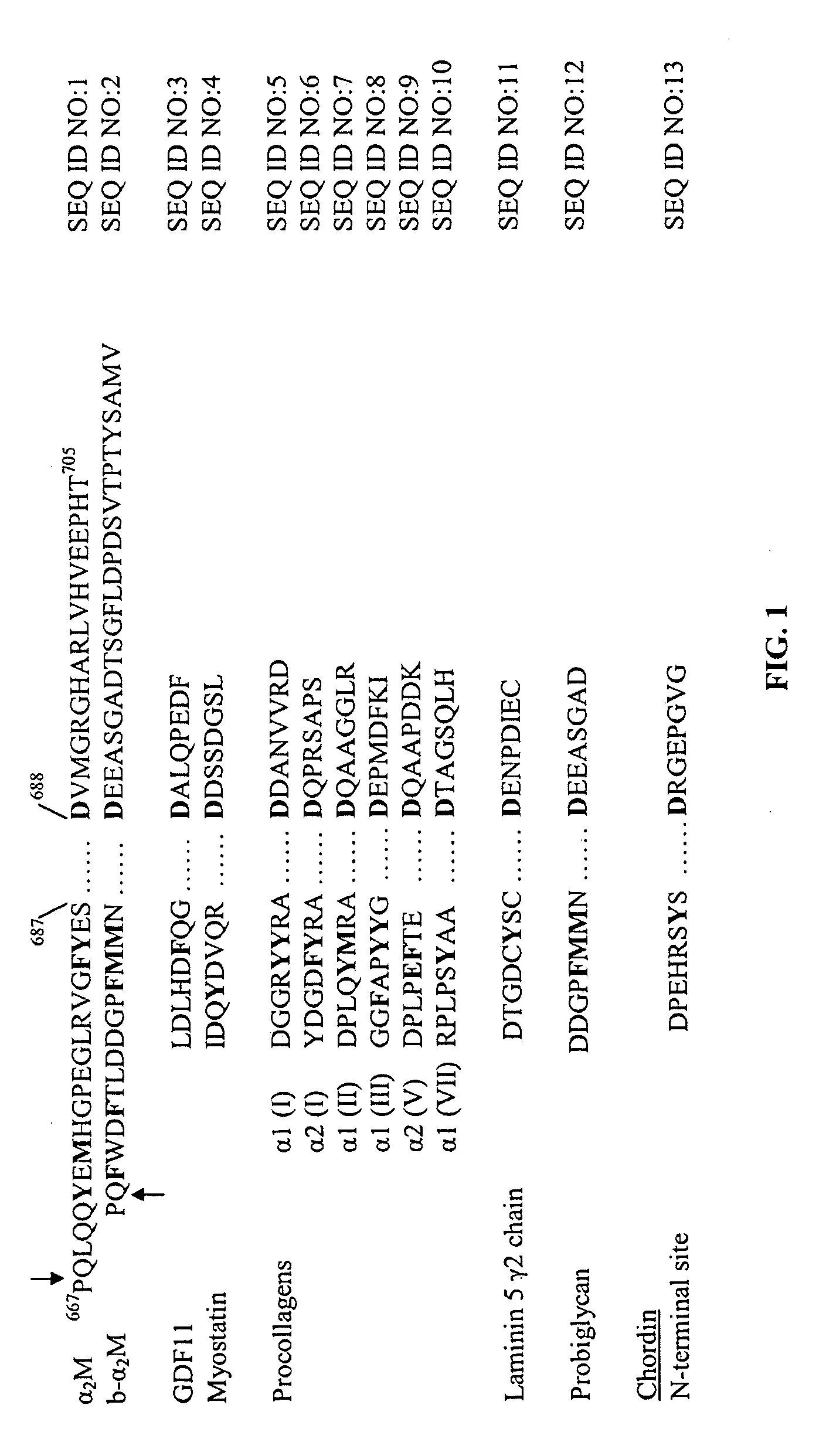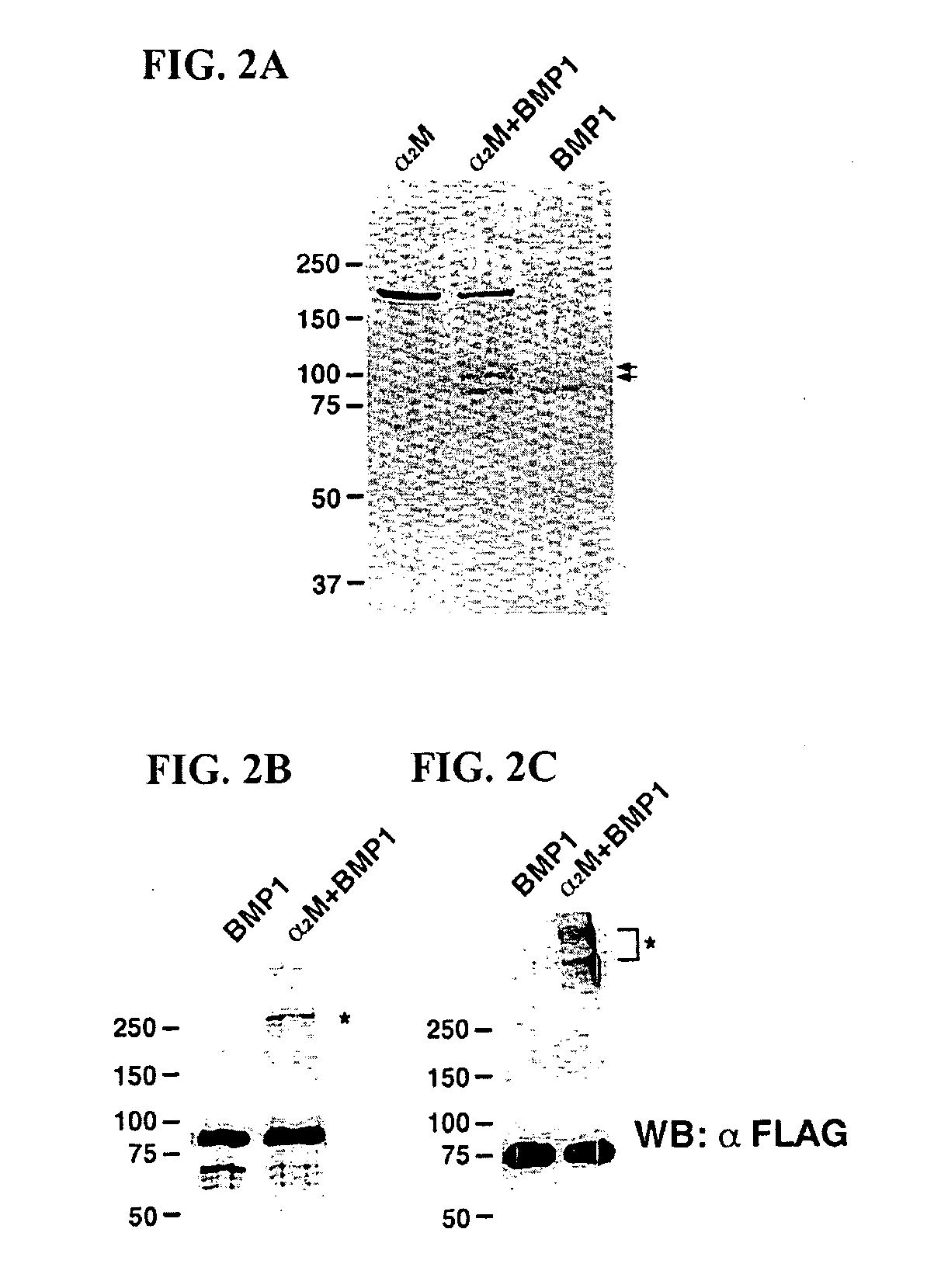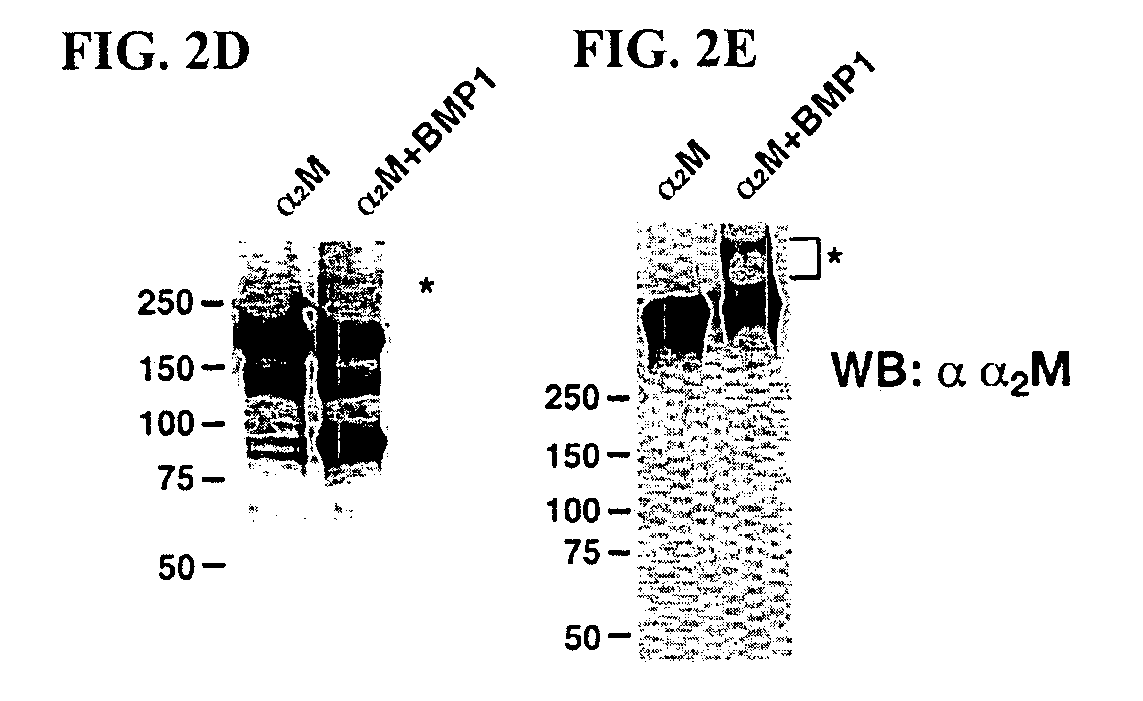Method and Composition for Treating a Fibrotic Disorder
a fibrotic disorder and composition technology, applied in the field of fibrotic disorder treatment, can solve the problems of high morbidity in the general population, and achieve the effect of reducing the severity or occurrence of the fibrotic disorder, and reducing the activity of bmp-1-like proteinas
- Summary
- Abstract
- Description
- Claims
- Application Information
AI Technical Summary
Benefits of technology
Problems solved by technology
Method used
Image
Examples
example 1
Inhibition of BMP-1 by α2M
[0032] Methods:
[0033] Cleavage of α2M by BMP-1: 200 nM Flag-tagged recombinant BMP-1, prepared and purified as previously described, was incubated overnight at 37° C. with 200 nM human α2M (Sigma-Aldrich; St. Louis, Mo.) in 50 mM Tris-HCl, pH 7.5, 100 mM NaCl and 10 mM CaCl2. Scott I, et al., “Mammalian BMP-1 / Tolloid-related metalloproteinases, including novel family member-mammalian Tolloid-like 2, have differential enzymatic activities and distributions of expression relevant to patterning and skeletogenesis,” Dev. Biol. 213:283-300 (1999). Subsequently, reaction proteins were analyzed by SDS-PAGE under reducing, conditions on a 7.5% gel and staining with Coomassie Brilliant Blue R-250. For Western blot analysis, 320 nM BMP-1 was incubated with 200 nM α2M at 37° C. overnight, and the samples were loaded on a 7.5% gels and separated by SDS-PAGE, under both nonreducing and reducing conditions. Separated proteins were transferred to polyvinylidene difluori...
example 2
Efficiency of b-α2M
[0055] Methods and Results:
[0056] b-α2M has enhanced ability to inhibit BMP-1: We previously noted wide differences in the efficiency (e.g., percent cleavage and rate of cleavage) with which different substrates art cleaved by BMP-1 (unpublished data). One of the substrates processed most efficiently by BMP-1 is probiglycan. We therefore sought to determine whether we could enhance the ability of α2M to inhibit BMP-1 by replacing the native bait region with sequences surrounding the probiglycan scissile bond (see FIG. 1).
[0057] As can be seen (FIG. 6A), b-α2M is cleaved by BMP-1 more readily than recombinant wild-type α2M (rα2M). When the pCP inhibitory activities of varying concentrations of rα2M and b-α2M′were measured (FIGS. 6B and 6C), they led to IC50 values of 133 nM and 1.88 nM, respectively. The IC50 value of 133 nm for rα2M suggests considerably less effectiveness in BMP-1 inhibition than the 4.82 value obtained for serum α2M (FIG. 3B, Table I); wherea...
example 3
Prophetic
Treatment of Fibrotic Disorders
[0062] A subject experiencing or at risk for a fibrotic disorder, such as lung fibrosis, kidney fibrosis or keloids is administered a an inhalant, injection or topical lotion (e.g., cream or ointment), respectively, comprising α2M or a modified α2M in an amount effective to reduce occurrence or severity of the fibrotic disorder. For example, a subject predisposed to keloids applies a topical cream, lotion or ointment comprising α2M or a modified α2M at least once a day. After treatment, fibrosis is prevented or reduced.
[0063] The invention can be tested by ascertaining anti-fibrotic effects in a model system in which pulmonary fibrosis is induced in mice via intratracheal (IT) instillation of bleomycin (2 U / kg). At 3 and 5 days following instillation with bleomycin, mice can be given IT installations of 40 nM wild type or altered α2M (30 μl / mouse), or PBS, as a negative control. Two weeks after initial bleomycin instillation, lung tissue ca...
PUM
| Property | Measurement | Unit |
|---|---|---|
| pH | aaaaa | aaaaa |
| volume | aaaaa | aaaaa |
| pH | aaaaa | aaaaa |
Abstract
Description
Claims
Application Information
 Login to View More
Login to View More - R&D
- Intellectual Property
- Life Sciences
- Materials
- Tech Scout
- Unparalleled Data Quality
- Higher Quality Content
- 60% Fewer Hallucinations
Browse by: Latest US Patents, China's latest patents, Technical Efficacy Thesaurus, Application Domain, Technology Topic, Popular Technical Reports.
© 2025 PatSnap. All rights reserved.Legal|Privacy policy|Modern Slavery Act Transparency Statement|Sitemap|About US| Contact US: help@patsnap.com



